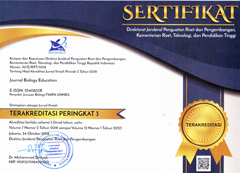The Development of Flipped Classroom-Based Human Reproductive System Learning Devices to Improve the Science Literacy Skills of High School Students
Abstract
Students' science literacy skills in Indonesia are still low. This is evidenced by studies conducted by PISA every three years. There needs to be an update of the learning model to improve students' science literacy skills. The outbreak of the COVID-19 pandemic in Indonesia caused learning to be done remotely. This study aims to produce appropriate learning devices that can be used during the COVID-19 pandemic. The method used is Research and Development which is modified into eight research steps. The research was conducted in the odd semester of the 2020/2021 academic year in the XII MIPA 1 and XII MIPA 3 classes of SMA N 1 Karangrayung. Data retrieval using questionnaires, interviews, and tests. The characteristics of the learning devices developed in this study were designed with a flipped classroom model that starts with self-asynchronous, then continues synchronous learning, and ends with collaborative asynchronous. The results showed (1) components of learning devices consisting of syllabus, RPP, LKS, and evaluation tools were declared very feasible by experts; (2) the components of the learning device get excellent response by the biology teacher and get an excellent response from the student. Based on these results, the learning devices developed are very feasible to be used in the process of online learning.
The copyright of the article once it is accepted for publication shall be assigned to the journal as the publisher. The intended copyright includes the right to publish the article in various forms (including reprints). The journal maintains the publishing rights to the published articles.
This work is licensed under a Creative Commons Attribution 4.0 International License.







